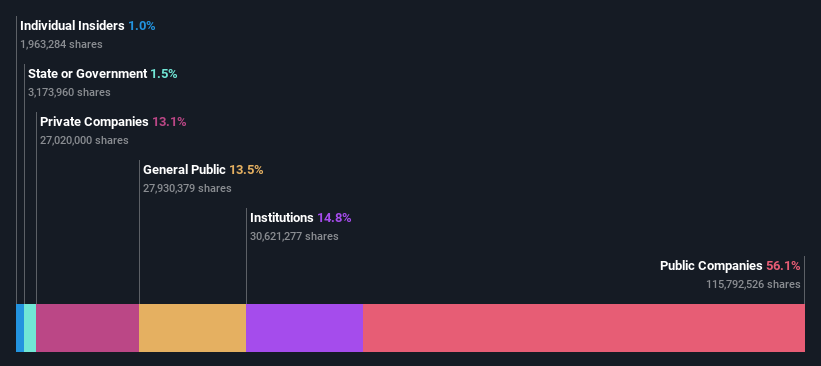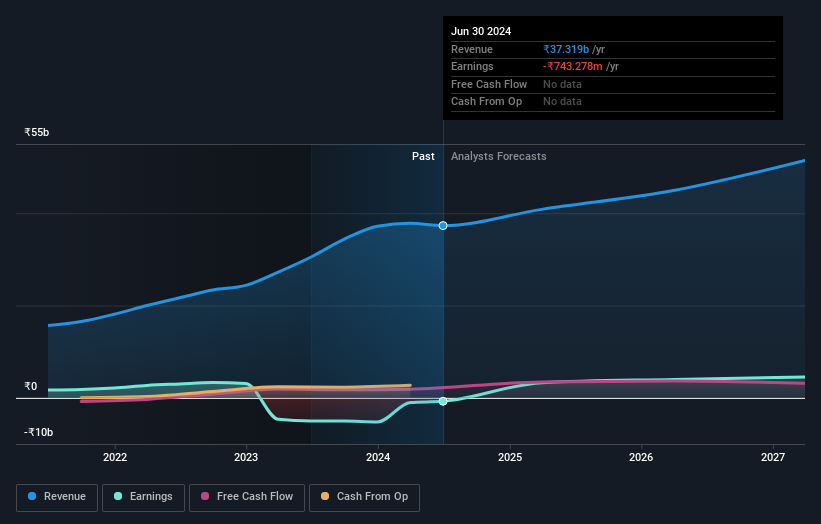- India
- /
- Basic Materials
- /
- NSEI:RHIM
Institutions along with public companies who hold considerable shares inRHI Magnesita India Limited (NSE:RHIM) come under pressure; lose 6.5% of holdings value
Key Insights
- Significant control over RHI Magnesita India by public companies implies that the general public has more power to influence management and governance-related decisions
- The largest shareholder of the company is RHI Magnesita N.V. with a 56% stake
- Institutions own 15% of RHI Magnesita India
If you want to know who really controls RHI Magnesita India Limited (NSE:RHIM), then you'll have to look at the makeup of its share registry. With 56% stake, public companies possess the maximum shares in the company. Put another way, the group faces the maximum upside potential (or downside risk).
Following a 6.5% decrease in the stock price last week, public companies suffered the most losses, but institutions who own 15% stock also took a hit.
Let's take a closer look to see what the different types of shareholders can tell us about RHI Magnesita India.
See our latest analysis for RHI Magnesita India

What Does The Institutional Ownership Tell Us About RHI Magnesita India?
Institutions typically measure themselves against a benchmark when reporting to their own investors, so they often become more enthusiastic about a stock once it's included in a major index. We would expect most companies to have some institutions on the register, especially if they are growing.
We can see that RHI Magnesita India does have institutional investors; and they hold a good portion of the company's stock. This can indicate that the company has a certain degree of credibility in the investment community. However, it is best to be wary of relying on the supposed validation that comes with institutional investors. They too, get it wrong sometimes. It is not uncommon to see a big share price drop if two large institutional investors try to sell out of a stock at the same time. So it is worth checking the past earnings trajectory of RHI Magnesita India, (below). Of course, keep in mind that there are other factors to consider, too.

RHI Magnesita India is not owned by hedge funds. Looking at our data, we can see that the largest shareholder is RHI Magnesita N.V. with 56% of shares outstanding. This implies that they have majority interest control of the future of the company. Meanwhile, the second and third largest shareholders, hold 13% and 2.3%, of the shares outstanding, respectively.
While it makes sense to study institutional ownership data for a company, it also makes sense to study analyst sentiments to know which way the wind is blowing. There is a little analyst coverage of the stock, but not much. So there is room for it to gain more coverage.
Insider Ownership Of RHI Magnesita India
The definition of an insider can differ slightly between different countries, but members of the board of directors always count. The company management answer to the board and the latter should represent the interests of shareholders. Notably, sometimes top-level managers are on the board themselves.
I generally consider insider ownership to be a good thing. However, on some occasions it makes it more difficult for other shareholders to hold the board accountable for decisions.
Our information suggests that RHI Magnesita India Limited insiders own under 1% of the company. But they may have an indirect interest through a corporate structure that we haven't picked up on. Keep in mind that it's a big company, and the insiders own ₹1.1b worth of shares. The absolute value might be more important than the proportional share. It is good to see board members owning shares, but it might be worth checking if those insiders have been buying.
General Public Ownership
The general public-- including retail investors -- own 14% stake in the company, and hence can't easily be ignored. While this group can't necessarily call the shots, it can certainly have a real influence on how the company is run.
Private Company Ownership
It seems that Private Companies own 13%, of the RHI Magnesita India stock. It might be worth looking deeper into this. If related parties, such as insiders, have an interest in one of these private companies, that should be disclosed in the annual report. Private companies may also have a strategic interest in the company.
Public Company Ownership
It appears to us that public companies own 56% of RHI Magnesita India. We can't be certain but it is quite possible this is a strategic stake. The businesses may be similar, or work together.
Next Steps:
I find it very interesting to look at who exactly owns a company. But to truly gain insight, we need to consider other information, too. Consider for instance, the ever-present spectre of investment risk. We've identified 1 warning sign with RHI Magnesita India , and understanding them should be part of your investment process.
If you would prefer discover what analysts are predicting in terms of future growth, do not miss this free report on analyst forecasts.
NB: Figures in this article are calculated using data from the last twelve months, which refer to the 12-month period ending on the last date of the month the financial statement is dated. This may not be consistent with full year annual report figures.
New: AI Stock Screener & Alerts
Our new AI Stock Screener scans the market every day to uncover opportunities.
• Dividend Powerhouses (3%+ Yield)
• Undervalued Small Caps with Insider Buying
• High growth Tech and AI Companies
Or build your own from over 50 metrics.
Have feedback on this article? Concerned about the content? Get in touch with us directly. Alternatively, email editorial-team (at) simplywallst.com.
This article by Simply Wall St is general in nature. We provide commentary based on historical data and analyst forecasts only using an unbiased methodology and our articles are not intended to be financial advice. It does not constitute a recommendation to buy or sell any stock, and does not take account of your objectives, or your financial situation. We aim to bring you long-term focused analysis driven by fundamental data. Note that our analysis may not factor in the latest price-sensitive company announcements or qualitative material. Simply Wall St has no position in any stocks mentioned.
About NSEI:RHIM
RHI Magnesita India
Engages in the manufacture and trading of refractories, monolithics, bricks, and ceramic paper in India and internationally.
Excellent balance sheet established dividend payer.
Market Insights
Community Narratives




